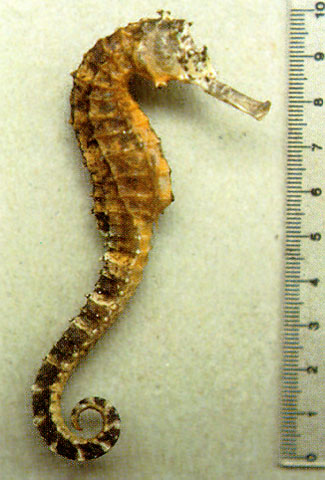| Syngnathidae (Pipefishes and seahorses), subfamily: Hippocampinae |
| 18.7 cm OT (male/unsexed) |
|
reef-associated; depth range 15 - 30 m, non-migratory |
| Western Central Pacific: Malaysia, Thailand, Singapore, Viet Nam, Indonesia and Philippines. Confused with Hippocampus kuda. International trade is monitored through a licensing system (CITES II, since 5.15.04) and a minimum size of 10 cm applies. |
|
Dorsal spines (total): 0-0; Dorsal soft rays (total): 17-19. Description: (based on 27 specimens): Adult height: 10.7-14.6cm. Rings: 11+35-36 (34-37). Snout length: 2.2 (1.9-2.5) in head length. Dorsal fin rays: 18 (17-19) covering 2+1 rings. Pectoral fin rays: 17 (16-19). Coronet: small and quite low, with five distinct rounded knobs or spines. Spines: knob-like and blunt, to well-developed and quite sharp; often with dark band around them near tip. Other distinctive characters: cheek spines double; double spines below, and sometimes also above eye; prominent, sharp nose spine; snout long and slender. Color pattern: commonly hues of yellow and black, sometimes alternating; striped tail (although this may not be visible in dark specimens); mottled or blotched pattern on body; may have fine white lines radiating from eye. |
| Length type refers to Height (= from top of coronet to the tip of straightened tail). This species is mainly found in pairs (Ref. 48635) on coral reefs, sponge gardens, kelp, and floating Sargassum. Nocturnal, site faithful. Feeds on zooplankton (Ref. 85309). Ovoviviparous (Ref. 205). The male carries the eggs in a brood pouch which is found under the tail (Ref. 205). Life span probably more than 2-3 years. Used for traditional Chinese medicine (Ref. 85309). |
|
Vulnerable (A2bd+4bd)
(Ref. 96402)
|
| harmless |
|
Source and more info: www.fishbase.org. For personal, classroom, and other internal use only. Not for publication.
Page created by Jen, 05.08.02,
php script by kbanasihan 06/09/2010 ,
last modified by
dsantos, 20/08/10

